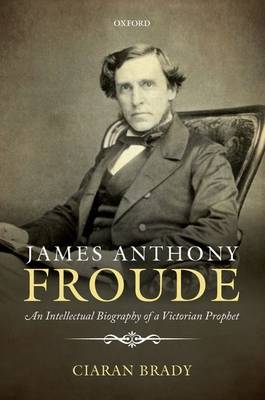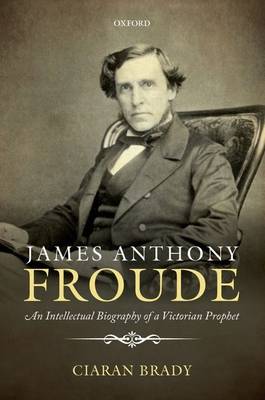
- Retrait gratuit dans votre magasin Club
- 7.000.000 titres dans notre catalogue
- Payer en toute sécurité
- Toujours un magasin près de chez vous
- Retrait gratuit dans votre magasin Club
- 7.000.0000 titres dans notre catalogue
- Payer en toute sécurité
- Toujours un magasin près de chez vous
Description
James Anthony Froude remains one of the most commonly referenced and frequently cited of Victorian public intellectuals. Known to intellectual historians as the author of a monumental History of England in the sixteenth century and as a key exponent of Victorian religious doubt, he is also frequently referenced as the author of a series of scandalously provocative novels and of a hugely controversial biography of Thomas Carlyle. Historians of the British Empire and of Ireland have frequently been compelled to address his sometimes outrageous (but often representative) historical writings. Scholars of mid-Victorian politics have no less often turned to Froude as a typical representative of Victorian fears of democracy, while more recently students of political thought have identified him as an early representative of a new form of Commonwealth civic republicanism. Yet for all that Froude remains a strangely marginalised, fragmented, and neglected figure. Ciaran Brady now addresses this remarkable gap. Based on a thorough critical examination of all of Froude's published works - many of which have been discovered and identified here for the first time - and supplemented by intensive research into Froude's private and widely scattered manuscript materials, he offers the first sustained study of Froude's life and thought. Against the common assumption that Froude's life can be divided along simple lines - the sometime enfant terrible who aged into a respectable man of letters - he argues that there was a deeper coherence underlying everything he wrote from the scandalous productions of the 1840s to the authoritative university lectures of the 1890s. In addition to providing a study of a major but neglected nineteenth century intellectual, Brady offers a critical analysis of the impulses, the aspirations, and the unquestioned assumptions underlying the Romantic project of personal renovation, and an alternative view of that unique phenomenon known as 'the Victorian sage'.
Spécifications
Parties prenantes
- Auteur(s) :
- Editeur:
Contenu
- Nombre de pages :
- 518
- Langue:
- Anglais
Caractéristiques
- EAN:
- 9780198726531
- Date de parution :
- 16-12-14
- Format:
- Livre broché
- Format numérique:
- Trade paperback (VS)
- Dimensions :
- 234 mm x 155 mm
- Poids :
- 793 g

Les avis
Nous publions uniquement les avis qui respectent les conditions requises. Consultez nos conditions pour les avis.






